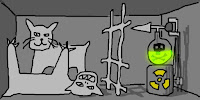Congress, whose actions could usually be most appropriately measured in Planck times and which is otherwise assumed to exist somewhere within the greater metropolitan area at any given point, is in the final stages of passing a new piece of legislation which is expected to declare the sundry processes employed to pass legislation, eliminating any previous obfuscation on the subject.
The exact content of the document still remains unknown as its position and momentum could not be simultaneously identified. Furthermore, C-SPAN’s inability to cover the proceedings of the closed-door debates had led some political insiders to believe that the congressional legislators were perhaps at once both alive and dead, until an intern for one of the presiding senators looked in to see what progress had been made, only to find that they had nearly finished. This has, of course, called into question the intern’s effects on the proceedings.
Though the daily machinations of the Legislative branch might often seem at odds with classical governance, the ability of the 112th Congress to do something meaningful, however undefined, has some optimists hopeful that this form of government can be made to assimilate with more traditional macrocosmic styles.
Many congressmen themselves have suggested that trying to quantify their own effectiveness to govern in conventional terms will only serve to constrain any results to the limits set by the metric used to measure. Rep. Bohr (I-DE) commented on the development of this new legislation stating, “What we do here is not as complex as it is, often anecdotally, made out to be. Anyone who takes the time to investigate will see that this stuff isn’t exactly quantum physics.”

No comments:
Post a Comment